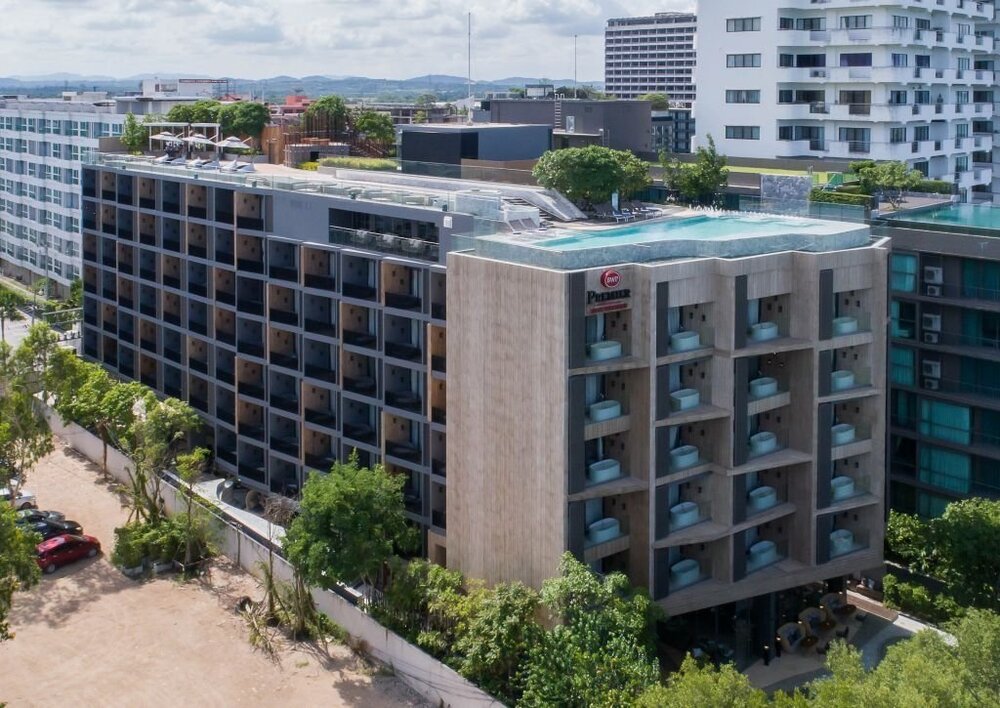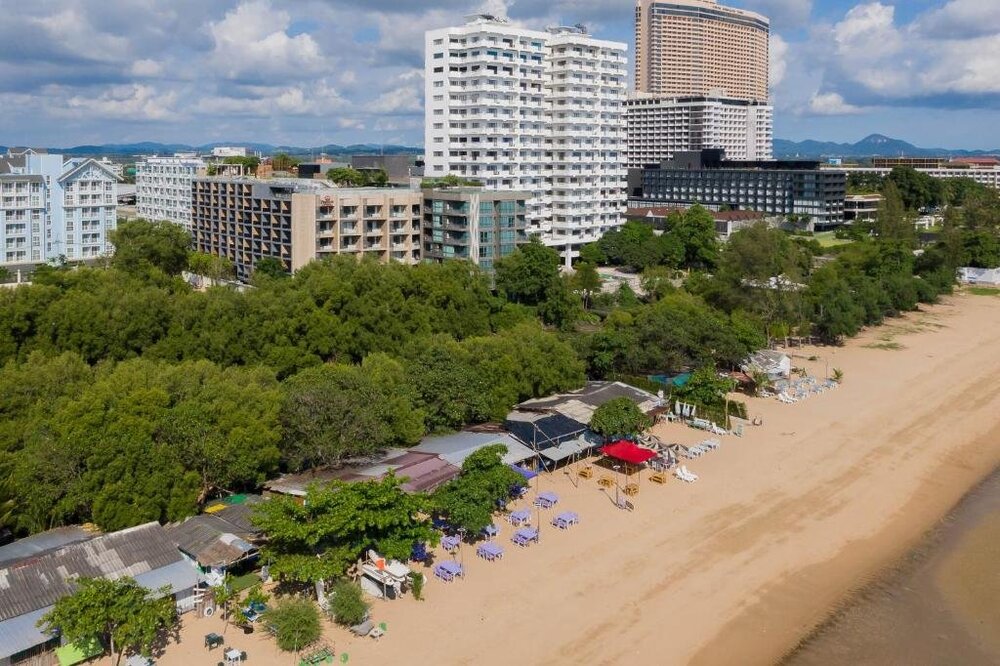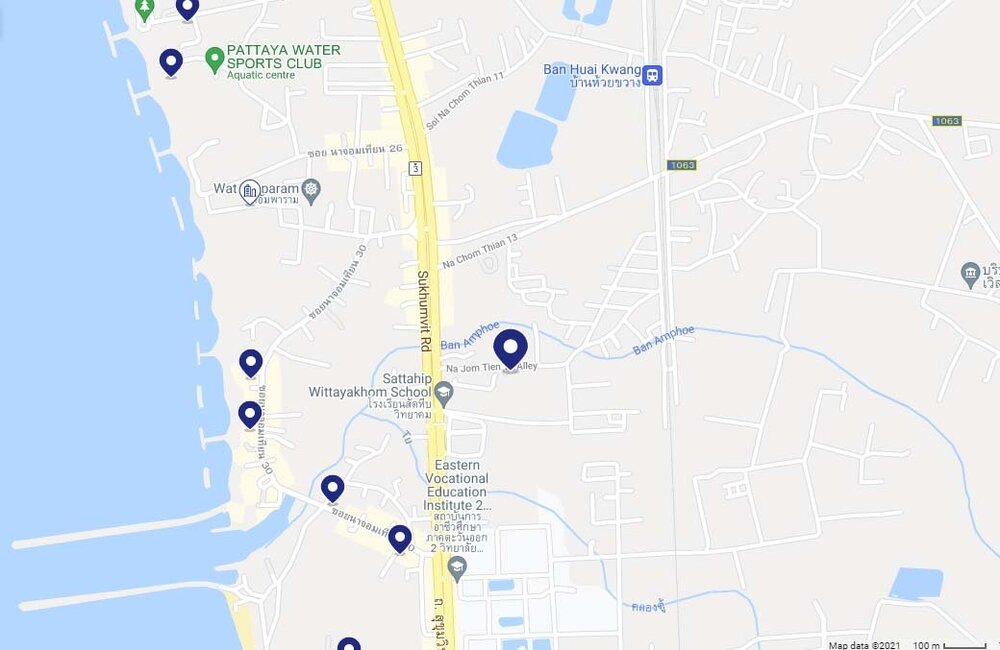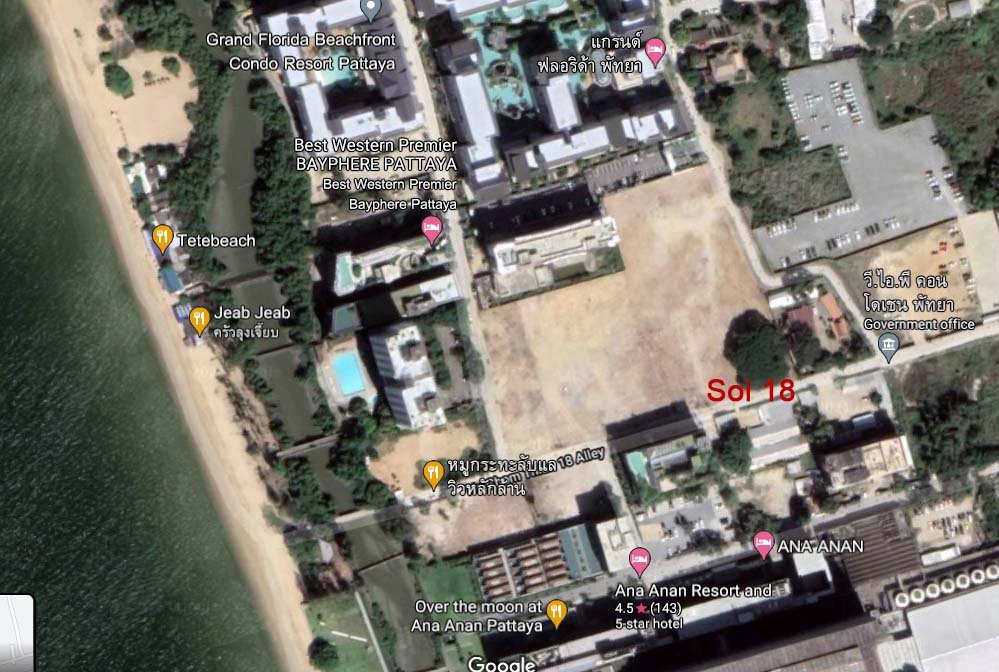-
Posts
1,124 -
Joined
-
Last visited
-
Days Won
14
Content Type
Profiles
Forums
Events
Everything posted by macaroni21
-
From the video, it looks to me that the entire beach-front road and the pedestrian footpath, parts of which have been washed away, were literally built on sand. No, "built" is too grand a word here. "Laid on sand" would be more accurate. I don't see any sturdy piles reaching down to bedrock. Hardly any wonder that even without major storms the road and walkway deteriorate rapidly, cracking and subsiding, as we have seen in years past. Seeing how much depth of sand there is under the road, it could well be that the orginal beach reached a further 30 - 50 metres inland, which suggests that the first row of houses have also been built on loose sand or soil, though some may have deep piles. But this is a legacy problem. If the orginal building owners built right up to the sandy beach, or even encroached onto the sand, then when the municipal government desires to put in a road, or widen the road in front of these houses, the road must necessarily be on sand too. The proper solution when planning to improve road access and public amenities would have been to exercise eminent domain (compulsory acquisition) with the authorities acquiring the first 30 - 50 metres of land for this purpose. That way, the investment to be put in to road and facilities construction would be on more solid ground. Of course I know compulsory purchase would come up against any number of powerful stakeholders with political connections. It may be too much to hope for. As for drainage, the video's subtitle at about 55 seconds says that "every 20 - 30 yards, there is a ditch". At 2:05, we see why. There is a fairly large diameter drainage pipe that goes no further forward than the edge of the bitumen. It was delivering storm water into the sand base about 1 metre below the beach surface. Perhaps there is a similar pipe running from the sois, perpendicular to the water line, every 20 - 30 metres. This is crazy; naturally, the flow of water from the pipe (which stops short) would undermine the stability of the sand beach. Even worse, in normal times, the pipe(s) would be delilvering untreated brown water from drains into the under-layers of the beach, dirty stuff which would naturally leach into the sea. Or, I shudder to think, perhaps even sewage. If they really wanted to protect the beach and keep it clean, then there should have been a deep (but covered) storm drain, almost a mini-canal, running parallel to the beach, e.g. on the seaward edge of the bitumen road. The capacity of the mini-canal should be sufficient to collect all the brown water from the drains, even on very wet days, taking said water to a treatment facility a few kilometres away. Water from the urban areas should not be allowed to flow into the sand or into the sea in front of the beach. But, TIT, I suppose!
-
I think you're right that the distressed businesses might have lost so much money, they won't have the capital to re-start even when the country re-opens. However, in the nature of business cycles, new entrepreneurs will step into the void. Having said that, the tourist market (and not just the farang tourist market) will take time to recover. It may be 2023 before we see anything resembling the options available in 2019. What will revive first is the segment that caters to the domestic Thai market, for example, the gay massage places that were located in Hway Khwang or Nonthaburi and which we often considered too far and too "no English spoken" to be worth the trouble. My guess is that the first wave of travellers will be horny and desperate enough to make the trek there. Then after a while, someone will see that the tourist market is sufficient to design a new enterprise for. Even so, revival of the tourist-oriented massage places (with more central locations and upscale facilities) will depend not on the farang arrivals, but on Asian arrivals -- since even before the pandemic, the Asian tourists were their biggest market. The Soi 4 bars, which have a base of resident expats, have a good chance of revival, though until tourists fully return, may remain subdued for perhaps 6 - 12 months. The gogo bars I find hard to predict. Capital for investment and footfall are not their only problems. For many years now, they've relied more and more on boys from Vietnam, Myanmar and Cambodia. Will these borders re-open? Will Covid be controlled in those countries? That's the extra spanner in the works. So far, I've only referenced Bangkok. Pattaya is another set of calculations. In addtion to all the above factors, Pattaya also has the issue of long-term decline, because it has never managed to appeal to gay Asians to make up for the shrinkage of gay farangs.
-
I was pleasantly surprised to read in a recent report that India's daily number of new Covid cases has recently been in the range of 20,000 -- that is until the latest news that Kerala State alone found 30,000 new cases yesterday. Only about four months ago, in April 2021, India was seeing roughly 400,000 cases a day. Nobody believes that figure then was an accurate count. But whatever the flaws behind the April figure, the same flaws are probably behind the latest figures. What's perhaps significant is not whether the figures are accurate, but the ratio between the two equally flawed figures. The number of daily new infections have come down to about 5 - 10 percent of the peak figure from four months ago. The governent of India didn't do a good job then, and though vaccinations are ramping up, aren't doing too well either. The country just cannot withstand lockdowns. The Indian example gives cause for optimism. Once past the peak, we may be able to hope for daily new infections to fall to a tenth of the peak figure within about four months (that's December, folks!). So, instead of reporting 20,000 cases a day, Thailand may, by then, be reporting 1,000 - 2,000 cases a day. Still a little worrying, but not a terrible figure considering the country's total population of 60 million. Also, Thailand's vaccination rate is looking hopeful too. That said, I am also conscious of the possibility that India's daily infection is falling unusually fast because its peak was so, so bad. About 68% of India's population was exposed to Covid (i.e. they have antibodies) and thus huge swathes of the population now have natural immunity. Since Thailand's worst number might not have been as bad as India's (relative to population), natural immunity may not be as widespread in Thailand, which can only mean that the fall-off in infections over the next few months may be more gradual. Maybe it won't be 1,000 - 2,000 in December, but perhaps more like 5,000? Would that be good enough to re-open? France with a similar population as Thailand currently has about 20,000 new cases a day. UK, also similar population has about 30,000 a day. And both countries are slowly opening up. (But they have better healthcare capacity, so they can risk it). The news story about Kerala State (https://www.dnaindia.com/india/video-india-reports-44658-fresh-covid-19-cases-with-30007-from-kerala-alone-2908164) must be seen in context. As explained in a BBC story from earlier this month (https://www.bbc.com/news/world-asia-india-58054124), the problem may stem from testing. Kerala smply tests more people than other Indian states. This too appears to be a weak spot for Thailand. I wouldn't take its daily count as accurate either.
-
I wonder if "hospitality services" include more intimate hospitality. It would be nice if it did and if the powers-that-be ensured that labour needs in this sector -- which ought to be classified as essential services -- are quickly met through importation of nationals from said countries. We're all ready to bring foreign exchange into Thailand! It's been too long.
-
If we think busloads of Chinese tourists in the past were bad, truckloads of Chinese money might be incomparably worse. The nightmare would be if Chinese money re-made the tourist trade of Pattaya into something resembling Sihanoukville. Google "Sihanoukville" to see what I mean, or read this article from the Guardian: https://www.theguardian.com/cities/2018/jul/31/no-cambodia-left-chinese-money-changing-sihanoukville
-

Thai Airways to resume int’l and domestic flight operations
macaroni21 replied to reader's topic in Gay Thailand
And governments can impose new lockdowns or quarantine requirements with hardly any notice. Do you hear me: Australia? -

Have moneyboys tried pivoting to online selling?
macaroni21 replied to macaroni21's topic in Gay Thailand
The BBC article opens with these sentences: "The subscription site OnlyFans, known for its adult content, has announced it will block sexually explicit photos and videos from 1 October. People will still be able to post nude content on the site. But this will need to be consistent with OnlyFans' policies." There is a very fine line (to the point of invisibility between sexually explicit (not allowed) and nude content (allowed?). I would have expected the reporter to query this before writing the story. As for its policies, I clicked through, only to be greeted with legalese, and am still none the wiser where the line is to be drawn. -

Have moneyboys tried pivoting to online selling?
macaroni21 replied to macaroni21's topic in Gay Thailand
PeterRS, I think we're not on the same wavelength. By "online interactions", I don't mean advertising on Grindr / Planet Romeo / Hornet, etc for meet-ups. I mean internet "sex" where the transaction is entirely remote. So the lad could be back in mama's house in Khon Kaen and the punter somewhere in Dumfries or Duisburg. -

Have moneyboys tried pivoting to online selling?
macaroni21 replied to macaroni21's topic in Gay Thailand
I don't know what went wrong in that instance, but I'm sure it's entirely possible to sell online just from the privacy of one's room. And if one is selling through a site like onlyfans.com, only subscribers would be able to see who you are. Can't imagine the Thai government conducting surveillance by subscribing to ("following") thousands of "performers" just to find out if they reveal too much of *shock/horror/blush* Thai tits, genitalia and buttholes. -

Have moneyboys tried pivoting to online selling?
macaroni21 replied to macaroni21's topic in Gay Thailand
I've never really understood the attraction of online interactions. The most important aspect of any sexxy interaction is tactile and online absolutely doesnt give you that. Can't imagine paying money for that. Like buying a beautifully-styled car that has no engine under the hood. What's the point? But maybe that's just me again, for I recognise that worldwide there is a market, maybe even a booming market... so I'm curious, if more and more of our previous hustlers moved online, how many of us would subscribe and/or pay? I guess you might say in return, "it depends on what they do". Let's just say, they do whatever the punter asks such as making use of a dildo or bringing himself to a climax. Basically, porn. Would you pay? (I would probably say to myself, "but there's so much free porn around".) -
A month or two ago, I read an article about the business model of onlyfans.com. Nothing really new there, but apparently the lockdowns from Covid have accelerated its business many times. Purveyors of in-the-flesh pleasures pivoted to selling virtual interactions instead. I am curious if Thai guys, many of whom must be badly out of work for months and months, have also tried to sell themselves virtually. I see no discussion anywhere about this (but then I haven't really looked hard) so my impression is that they have not. If so, is it for want of trying or might there be technical obstacles? Or do you think there's really no market for online interactions with Thai lads?
-
Was it only me or did anyone else sense that the original post was tongue-in-cheek?
-
Oh well, there goes the "exclusively for men" promise, rainbow-coloured floors notwithstanding.
-
Chanced upong this Youtube video from March 2020, but I don't know when the event was. What was interesting was that the place was apparently in Hua Hin -- maybe there's new life there after all -- and the video title said (according to Google Translate at least) "Fitness club exclusively for men Lemannclub". Despite the "exlcusively" promise, the event was disappointingly heteronormative.
-

Infections may be “3-4 times higher” than government-declared total
macaroni21 replied to reader's topic in Gay Thailand
A bit of a screamer: "The Public Health Ministry said on Sunday more than 600 medical workers who received two doses of China's Sinovac vaccine have been infected with Covid-19, as authorities weigh giving booster doses to raise immunity." Fortunately, this Bangkok Post story sobered up and added, "Of the 677,348 medical personnel who received two doses of Sinovac, 618 -- less than 1% -- became infected, ministry data from April 1 to July 10 showed. A nurse has died and another medical worker is in critical condition." To have 1 percent infected after vaccination isn't all that surprising, but the headline isn't going to help persuade those who are already vaccine-hesitant. -
I can't predict what the future will hold -- will the bars even return??? -- but buttholes there definitely were in the past, even the recent past. Many members on this board might remember the act where a usually-effeminate dancer would go prancing around the stage pulling a string out of her lower orifice. The string bore plastic flowers (fluorescent pink, as I remember) at quite close intervals, about 10 - 15 cm apart. Dancing or jerking to the beat of the music, she would weave her way between the gogo poles so that the string, eventually some 8 to 10 metres long, would stretch across the poles like some sort of Do-not-cross police cordon. I think it was the old Dreamboys on Soi Twilight that had this show quite regularly. i can't help a touch a nostalgia as I type this, even though it was no titillation for me when it was performed. Cringe might be a better description of my reaction. That having been said, I don't suppose, from your question, you were hoping to see a reprise of something like this, were you?
-
Almost surely you were in the original Twilight Bar of Soi Twilight, though it could have been in the bar's subsequent phase -- the early days of Hotmale in the same location. I remember those days fondly too.
-
It's only one week since the Phuket Sandbox trial began and there couldn't have been many visitors yet. But they've already found one infected tourist. However, the most significant part about this story is that as soon as they identified this case, "Other tourists in the same group had been placed in 14-day quarantine". So this adds another risk. All it takes is for one positive test from a member of the group -- does this also mean everyone else who arrived on the same flight? -- and the rest are slammed into 14 days' quarantine. No different from arriving in any other part of the country. Another interesting tidbit from the story is the statement that "70% of the population has now received two doses of Covid-19 vaccine", presumably Sinovac. https://www.bangkokpost.com/thailand/general/2144879/first-covid-infected-tourist-found-in-phuket-sandbox
-

Infections may be “3-4 times higher” than government-declared total
macaroni21 replied to reader's topic in Gay Thailand
Allowing that this 20 percent positivity rate is coming from one hospital's testing and may not be representative of data from testing centres nationwide, it is indeed very concerning and supports the estimate that the true number of infections is a few mutliples higher. I doubt if Thailand's testing programme is comprehensive -- I can't find the data on total testing numbers in the short time I have. Here is an explanation of why high positivity numbers generally indicate under-reporting of cases. "This also makes sense intuitively: if you test everyone, then the positvity rate will be very low, and you will catch every case. But if testing is not widely available, then you will catch only the severe cases, resulting in a higher positivity rate. This phenomenon is sometimes referred to as preferential testing." Source: https://covid19-projections.com/estimating-true-infections-revisited/ The World Health Organisation uses 5% as a bench-mark. A positivity rate above that should be taken to indicate that true infection numbers are higher than reported. Of course it is possible that at any one time, in a really terrible epidemic ( e.g. Black Death), more than 5% would be infected at any one time, and even if one tested 100% of the population, the positivity rate will be a figure higher than 5%. Yet, that result would not be an under-report becuase you had tested everyone. However, in most epidemics, including this one, it's really a rolling infection, and even in the worst situations, it is unlikely that more than 5% of people would be infected at any one time. So if test results come in at 20% positive, it suggests that we should test more for a better grasp of the situation. The only way out of this epidemic is vaccination, but as others have noted, the roll-out is relatively slow in Thailand, especially when compared against the greater transmissibility of the Delta variant. Bad news just came in. Even the best performing vaccines (Pfizer, Moderna) are demonstrating only 64% effectiveness aganst infection from Delta. The silver lining is that even if infected, the vaccine will protect against serious illness from Delta. Here, it gives 94% protection. "TEL AVIV—Data from Israel suggest Pfizer Inc.’s vaccine is less effective at protecting against infections caused by the Delta variant of Covid-19 but retains its potency to prevent severe illness from the highly contagious strain. The vaccine protected 64% of inoculated people from infection during an outbreak of the Delta variant, down from 94% before, according to Israel’s Health Ministry. It was 94% effective at preventing severe illness in the same period, compared with 97% before, the ministry said. An Israeli official said Tuesday the health ministry findings released a day earlier were preliminary and based on data collected from June 6 through early July." Source: Wall Street Journal https://www.wsj.com/articles/pfizers-covid-19-vaccine-is-less-effective-against-delta-variant-israeli-data-show-11625572796 -

Expats are included in Thailand’s vaccination plan
macaroni21 replied to TotallyOz's topic in Gay Thailand
Then again, let's not even assume that the signed "contract" was between Thailand and the vaccine manufacturer. I shall entertain the possibility that it could have been between the ministry and some local representative of the vaccine manufacturer specifying no details of price or delivery date (mere minor details, you understand), but setting down the most important aspect of any purchase: the percentage commission to be diverted to certain bigwigs. -

Tourist provinces to reopen in October, minister says
macaroni21 replied to reader's topic in Gay Thailand
Thanks for the replies. I was in Phnom Penh last year and the pickings were slim, though good enough for a few days. If, as z909 suggests, Siem Reap offers even less of such "cultural entertainment", it may prove disappointing. As for the ruins, I was there eons ago before the recnt popularity and surge of tourists. I even visited a few of the ones further away. They're certainly fantastic, and if there's a time to revisit them, it might just be now before the surges of tourists come back. -

Expats are included in Thailand’s vaccination plan
macaroni21 replied to TotallyOz's topic in Gay Thailand
Let me see if I understand this. 1. "the head of the Department of Disease Control signed the contract yesterday", even though 2. "the vaccine has yet to be approved by Thailand’s Food and Drug Administration", and 3. "the price is not yet agreed and the DDC has a month to negotiate pricing and other conditions with the manufacturer," and 4. "delivery will be some time this year, but when exactly is unclear" What sort of contract might that be? As for the Johnson and Johnson vaccine, 5. "Anutin said the government has also received approval from the Office of the Attorney-General to purchase supplies of the Johnson & Johnson single-dose vaccine." Why is the AG involved? -

Tourist provinces to reopen in October, minister says
macaroni21 replied to reader's topic in Gay Thailand
Might just consider this if Thailand doesn't open up soon. Would those more knowledgeable be able to advise, since I'm no fan of cultural shows, what other forms of entertainment might be available on Siem Reap evenings? I'm not expecting it to be like Bangkok or Pattaya, but a small selection of bars with take-out, or massage...? I've heard of a sauna though I cannot recall the name. -
It's at the arse end of Jomtien. As someone who has wasted time looking for a hotel which I had booked, but had been given misleading information and worse, misleading location, I am always on the lookout for more of such nonsense. Looking at the pictures at the booking.com site, I began to suspect that there was something misleading about the topmost photo at the FTN news site. This picture (copied below) gives the impression, if one is not careful, that the hotel is on the beach. However, the cars parked in the sandy-coloured area at the left of the photo were a give-away. Though people do park their cars on the sand, a comparison of the above picture with another one on the booking.com site (shown below) indicates that it is the side of the building with balcony bathtubs that face the sea. The sandy-coloured area is an undeveloped patch of land which no doubt will soon be built up, providing great views (of solid wall or other people's windows) for those rooms on the right side of the above photo. The second picture clearly shows that the hotel does not have a beach front, though it also shows that it does not stand as far back as booking.com's Google Map location suggests. In fact, the booking.com map pointer is plain wrong, off by some 3 kilometres!!! That pointer locates the hotel at Na Jomtien Soi 15, when the booking.com page itself says the address is Na Jomtien Soi 18. This kind of carelessness annoys me. So, I look for Na Jomtien Soi 18 on Google Maps proper, and lo and behold, it has Best Western Bayphere (how does one pronounce that without saying "bay-fear") much much closer to soi 18. Why booking.com doesn't link to the correct map is a mystery. This location is at least consistent with the second photo above. The above satelite picture now indicates this hotel to be only 100m or so from the beach, across a swampy river which one hopes isn't fetid. All that said and done, it's still at the arse end of Jomtien.
-

Expats are included in Thailand’s vaccination plan
macaroni21 replied to TotallyOz's topic in Gay Thailand
For the benefit of us not living in Thailand, could you explain what a pink ID card is? Is it a form of permanent residency? Does it allow the card holder to work (i.e. paid employment)? It seems to me that you've lived a while in Thailand and have not needed this card until now -- and even then, as z909 says, it should have had no bearing on your vaccine entitlement -- so whatever this pink confection is, it has as little practical value as a pink tutu.








